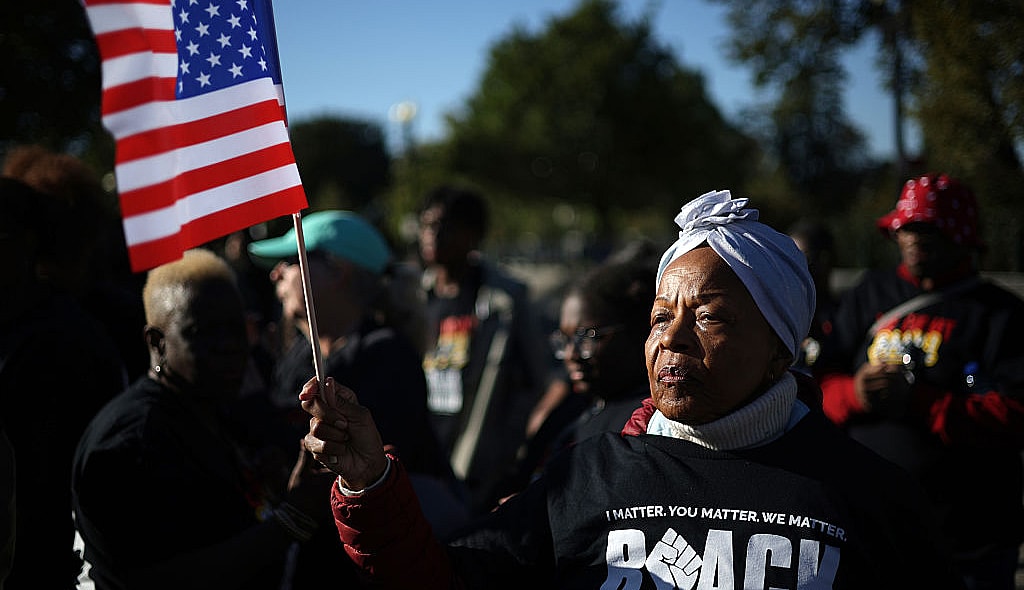KURIGA, Nigeria (AP) — Rashidat Hamza is in despair. All but one of her six children are among the nearly 300 students abducted from their school in Nigeria’s northwest, riddled with Islamic extremists and armed gangs.
It has been more than two days after her children — ages 7 to 18 — went to school in the remote town of Kuriga in Kaduna state only to be kidnapped by gunmen. She was still in shock Saturday.
Authorities said at least 100 children aged 12 or younger were among the abductees in the state known for violent killings lawlessness and dangerous roads where people get regularly snatched.
“We don’t know what to do, but we believe in God,” Hamza told The Associated Press during a visit to the town.

The mass kidnapping in Kuriga was the third in northern Nigeria since last week; a group of gunmen abducted 15 children from a school in another northwestern state, Sokoto, before dawn Saturday, and a few days earlier 200 people, mostly women and children displaced by conflict, were kidnapped in northeastern Borno State.
The kidnappings are a stark reminder of the security crisis plaguing Africa’s most populous country.
No group claimed responsibility for any of the recent abductions. But Islamic extremists waging an insurgency in the northeast are suspected of carrying out the kidnapping in Borno. Locals blame the school abductions on herders who are in conflict with the settled communities.
It’s not the first time for a student kidnapping in Nigeria to shock the world. In 2014, Islamic extremists abducted more than 200 schoolgirls from Borno’s Chibok, sparking the global #BringBackOurGirls social media campaign. A decade later, at least 1,400 Nigerian students have so far been abducted from their schools in similar circumstances. Some are still held captive, including nearly 100 of the Chibok girls.
Recalling Thursday’s kidnapping, Nura Ahmad, a teacher, told the AP that students were just settling into their classrooms at the government primary and secondary school when gunmen “came in dozens, riding on bikes and shooting sporadically.”

The LEA Primary and Secondary School, one of the few educational facilities in this area, sits by the road just at the entrance of the town, tucked in the middle of forests and savannah. Even with its decaying roof and wrecked walls, it gave parents hope for a better future for their children.
“They surrounded the school and blocked all passages … and roads” to prevent help from coming before kidnapping the children in less than five minutes, Ahmad said.
Fourteen-year-old Abdullahi Usman braved gunshots to escape the captors.
“Those who refused to move fast were either forced on the motorcycles or threatened by gunshots fired into the air,” Abdullahi said. “The bandits were shouting: Go! Go! Go!” he said.
Nigerian police and soldiers headed into the forests Friday to search for the missing children, but combing the wooded expanses of northwestern Nigeria could take weeks, observers said.
“Since this happened, my brain has been muddled,” said Shehu Lawal, the father of a 13-year-old boy who is among those abducted.
“My child didn’t even eat breakfast before leaving. His mother fainted (upon hearing the news),” he said.
Some villagers like Lawan Yaro, whose five grandchildren are among the abducted, say their hopes are already fading.
People are used to the region’s insecurity, “but it has never been in this manner,” he said.
“We are crying, looking for help from the government and God, but it is the gunmen that will decide to bring the children back,” Yaro said. “God will help us.”
But schools are not the only targets.
Recommended Stories
More than 3,500 people have been abducted across Nigeria in the last year, according to the Armed Conflict Location and Event Data Project. Some were even kidnapped from their homes in the capital of Abuja. Last year, President Bola Tinubu took office after he successfully campaigned on the promise to tighten security and stop the kidnappings.
Experts say it is easy to smuggle in arms, used in kidnappings, over Nigeria’s poorly policed borders. More than half of its 1,500-kilometer (932-mile) border with Niger, for instance, stretches across the northwest. Though mostly covered in woodland savannah, the region also has vast ungoverned and unoccupied forests where organized gangs hide and keep their kidnap victims.
In 2022, lawmakers passed a bill to penalize ransom payments, but Nigerian kidnappers are known for their brutality, forcing many families to succumb to their demands.
Nigeria’s military continues to conduct air raids and special military operations in the region as well as respond to pockets of crisis across the country but is fatigued by the 14-year Islamist insurgency in the northeast. Armed gangs also keep on multiplying in the region where many are poor and often work with extremists, seeking to expand their operations.

The military previously said that sometimes kidnap victims were used as “human shields” to prevent aerial bombardments of the forests where their captors hide.
The gangs are “adapting their strategies and further entrenching themselves in the northwest through extortion,” said James Barnett, a researcher specializing in West Africa at the U.S.-based Hudson Institute.
“Their mentality is that they should be allowed free rein to do what they please in the northwest and that if the state challenges them, directly or indirectly, they will have to respond and show their strength,” Barnett said.
More than a dozen checkpoints and military trucks now dot the dangerous 55-mile (89 kilometers) road running from Kuriga town to the city of Kaduna. But the soldiers are likely to be redeployed elsewhere soon, depending on security needs.
People in Kuriga can only hope their children are returned unharmed and the safety they now feel with the presence of military personnel endures.
Hamza, the mother whose five children were kidnapped, hopes the government will arrest the kidnappers and return the students. “The gunmen don’t allow us to have peace.”
Never miss a beat: Get our daily stories straight to your inbox with theGrio’s newsletter.









